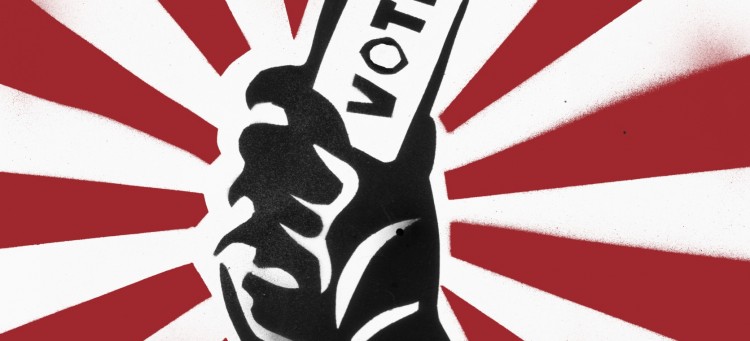
Conversations
Person or Party: A voter's conundrum
Rhonda Kronyk
October, 2015
The federal election is upon us, and as voters, we’re faced with the privilege of having to choose. For many of us, that choice comes down to person or party. Sometimes that translates to a vote for the party or party leader; other times, it’s a vote for the person, regardless of political affiliation. Here in the St. Albert-Edmonton riding, voters are preparing to make that very decision. With an incumbent who is running as an independent on our ballot, we find ourselves in the unique position of exploring the strategies behind voting for a person or party. To do so, it helps to understand our parliamentary system, the role of an MP (independent or otherwise) and, of course, what the candidates are saying.
Our Political Landscape
Prime Minister Stephen Harper dropped the writ on August 2, 2015, making election day October 19. Most of Canada’s 338 electoral districts, a.k.a. ridings, have a candidate from the three primary parties (Liberal, PC, NDP). Many ridings also have candidates from the Green Party or the Bloc Québécois, and there are several independent candidates who are not affiliated with any party.
Though today it’s considered unusual to vote an independent MP into office, this was not always the case. In fact, the Constitution itself does not refer to political parties or to the Prime Minister; it speaks of electoral representatives and of Canadians voting for a representative in their riding to become their member of Parliament (MP). Each MP then gets a seat in the House of Commons where they are supposed to represent the interests of their riding, not their party. According to Dave Cournoyer, communications advisor and creator of the award-winning political blog daveberta.ca, “we have seen centralization and a shift to a party structure. Our current move towards electing a leader rather than a riding representative feels like an influence from the American system. We have become so focused on our party leaders that a lot of voters may not know who their candidate is. They vote on the national level rather than look at the quality of their local candidate.”
The Role of an MP
According to the Parliament of Canada’s Guide to the Canadian House of Commons, MPs represent their constituents’ views by presenting petitions, making statements and asking questions in the House. The most visible part of their job is often in the Chamber where they debate laws and highlight issues. However, their work in the Chamber is only part of what they do. Many MPs also work on committees where they have the chance to study bills in detail and investigate issues of importance. MPs who work within federal parties also sit in caucus meetings where they help craft the party’s policies. They also meet with their constituents, answer questions, help people understand federal programs and spend time in their home ridings.
When you get to the polls, your ballot will ask you to select one candidate to represent you in Parliament. Given their role as electoral representatives, it is important to get to know them better. The candidates in St. Albert-Edmonton are Michael Cooper, Beatrice Ghettuba, Darlene Malayko, Andrea Oldham and Brent Rathgeber. Michael Cooper did not respond to any of our requests for an interview. Here’s what everyone else had to say.
Beatrice Ghettuba, Liberal
Beatrice Ghettuba moved to Canada from her native Kenya in 1998 where she was a certified public accountant (CPA) for an international transportation association. She says she moved to Canada because she knew that some of the barriers she faced as a woman in business would disappear. Ghettuba earned a CPA (Chartered Professional Accountant) in Canada and is a managing partner at K2Z Accounting Associates. Ghettuba is also a community advocate for newcomers to Canada. “My community work led me to politics because I knew I could give back and make a difference in people’s lives,” says Ghettuba.
Ghettuba is a strong proponent of democratic rights. She believes the role of government is to “put systems in place for everybody to exercise their sense of well-being.” She does not believe that an independent MP can influence policy in a meaningful way, stating that “politics is a communal system. Mr. Rathgeber is very well beloved in St. Albert, and I respect him tremendously, but being part of a caucus is powerful and allows MPs to achieve more.”
Ghettuba, however, says she would not blindly vote with her party: “I know that in a democracy, people can vote with their conscience. A conscience does not come from dogma or ideology, but from learning from everybody. It is important to be able to articulate what you say respectfully, not just parrot without thought.”
Ghettuba also says the most important issue to St. Albert voters is the economy. “As an accountant, I know it is not possible for the Conservatives to balance the books without doing something drastic. And I love Mulcair, but his plan cannot balance the budget. Everything we do flows out of having a sound economic base, and right now too many people are feeling hopeless—they’ve lost their jobs, they may not qualify for EI, and they have nowhere to turn.” She believes Trudeau’s plan to jump-start the economy through infrastructure spending is the best way to get Canadians back to work.
Darlene Malayko, NDP
Darlene Malayko is a former transit operator and union shop steward. She was on a committee with the Alberta Federation of Labour for two years and has long represented the working class values she comes from.
Malayko doesn’t believe there are any advantages to working as an independent MP and says the biggest disadvantage is the lack of leadership. “If you look up Darlene Malayko, you find the NDP,” she says. “If you look up an independent, you won’t have a definition of who he is and what he stands for. [The NDP has] an experienced, trustworthy leader who sets the plan and priorities and who wants to bring change.”
Malayko also believes that party support is an advantage in launching a campaign, noting that when she meets with other candidates, they talk about their campaigns and get advice from a local MP. “Once you’re an elected member, you have party support. An independent doesn’t have any of that.”
Malayko doesn’t foresee problems voting with the NDP caucus “because I agree with almost all of their policies. You may not 100% agree, but you can discuss it with your party. You can talk about it and come to terms with it.” And on bigger issues, such as Bill C-51, she says having the bigger voice of a party is important.
Malayko is confident the NDP will form a majority government. She acknowledges that she would be new to the job but says, “nobody who goes into this job has any experience. It’s all learnable. Nobody studies to be an MP. There’s no job description for it.” But she is confident she will have party support to help her represent St. Albert constituents in the things that are important to them, such as municipalities, families, transit strategy, the environment, pensions and taxes.
Andrea Oldham, Green Party
Andrea Oldham did not declare in time to give an interview but granted us permission to use information from her biography on the Green Party website for this story.
Oldham received a BA in International Studies in the stream of International Affairs and Global Policy. She spent time working on various international projects. She joined the Green Party in June 2014 and is now the party’s Prairie Organizer.
Brent Rathgeber, (Incumbent), Independent
Brent Rathgeber was an Alberta Progressive Conservative MLA from 2001 to 2004. In 2008, he was elected to sit as a Conservative MP for St. Albert-Edmonton. In 2013, he resigned from the Conservative Party to sit as an independent MP after he lost support for a private members bill. The bill called for greater transparency and accountability about senior civil servants’ salaries and expenses. Initially, the bill had the support of the Party, but the Prime Minister’s Office (PMO) withdrew that support when Senate spending problems came to light. The PMO tried to convince Rathgeber to gut the bill, but it would have become ineffectual in exposing salaries and expenses. Rathgeber refused and stepped down.
Even though Rathgeber’s bill was the catalyst that led to his resignation, his bigger issue with the Conservative Party is the way the PMO micromanages the party. According to Cournoyer, “In Canada we’ve gone very far in terms of control over individual MPs. We’ve gone from a culture of message discipline to almost a message dogma where any deviation from the party-approved message is frowned upon.”
As an independent MP, Rathgeber says he can put his constituents first, stating that “In our system, MPs almost always vote with their caucus and dissenters are quickly punished.” Now he says he votes with the Conservatives only when he thinks it is best for Canadians. “I inform myself. I listen to debates. I read and consult. I have very informed constituents who write me letters about big issues such as Bill C-51 and the Temporary Foreign Worker Program,” says Rathgeber. And contrary to some beliefs, independent MPs get speaking time in Question Period. As an independent MP, Rathgeber has asked 44 questions and has given 11 statements. As a Conservative, he asked 12 questions and gave 25 statements. In Cournoyer’s opinion, “Mr. Rathgeber has been able to get his message out.”
Ridings that have independent candidates don’t always miss out on federal funding, either. Rathgeber says his riding got a significant influx of cash just before the 2015 election was called. “You don’t need a seat at a government table to get funding,” he says. “Government is more worried about ridings they need to win.”
Rathgeber does, however, acknowledge some disadvantages of not working with a party. Resigning cost him personal friendships, both federally and locally. He also says there are institutional costs because people believe that politicians can be effective only when they are part of a team. He admits there is something to that because it is easier to convince people to vote with you when you are part of a caucus. Yet, he thinks support is overstated because it is not guaranteed: “I had support, but when the PMO withdrew its support, caucus support folded. And my bill was a philosophically Conservative bill because it showed respect for taxpayers and held government to account.”
Forming Government
To many voters, the decision to vote for a party or a person becomes especially important if they feel the election may result in a minority government (which happens when no party gains the 170 seats necessary to form a majority). Several polls show that the 2015 election is a close race between the three major parties. If Canadians do not elect a clear majority, the party that wins the most seats has the opportunity to form either a coalition or a minority government.
To form a coalition government, two or more parties must agree to work as a single party and divide leadership roles among themselves. To form a minority government, the party must seek the backing of enough MPs to command the support of the House, but they do not work as a single party. As long as they retain support, the minority government stays in power. In a majority government, an independent MP may not play a large role. But according to Cournoyer, an independent MP in a minority government could be very advantageous for a riding, noting that in the past, independent MPs have helped pass laws and have kept a minority government in power.
The right to elect our government representatives is one of the great privileges of democracy. As you get to know your candidates, the most important thing to remember is to exercise your democratic right to vote. After all, our system depends on participation, and in the end, we are the government we elect.
St. Albert-Edmonton Candidates at a Glance
- Michael Cooper—Conservative. Former Rathgeber campaign manager.
- Beatrice Ghettuba—Liberal. Immigrant from Kenya and Chartered Professional Accountant.
- Darlene Malayko—NDP. Former union shop steward.
- Andrea Oldham—Green. Degree in International Affairs and Global Policy.
- Brent Rathgeber (incumbent)—Independent. MP since 2008.
Cast Your Vote
You can cast your ballot during one of four advance voting days or at your polling station on election day. You can vote at any Elections Canada office before 6pm on October 13. Finally, you can vote by mail if the application is received by 6pm on October 13. The necessary information is on your voter information card.












